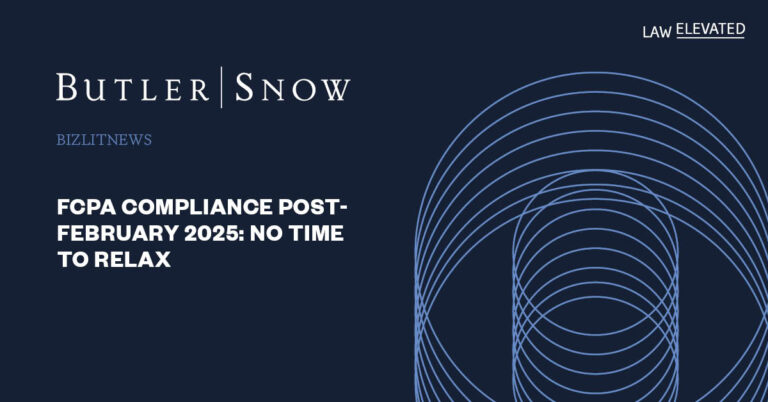Less than one month following President Donald Trump’s January 20, 2025 inauguration, on February 10, 2025, the White House issued an order pausing FCPA enforcement actions (e.g., new investigations and ongoing enforcement actions) for an initial period of 180 days, for the Attorney General to review, examine and update applicable guidelines and policies as well as existing investigations and actions— for the purpose of promoting the President’s authority “…to conduct foreign affairs and prioritize American interests…[and]…economic competitiveness…and the efficient use of Federal law enforcement resources.” (See: Executive Order 14209, Pausing Foreign Corrupt Practices Act Enforcement to Further American Economic and National Security. Sec.2).
To some, who regarded strict compliance with the FCPA as burden which would now be lifted altogether or at least mitigated, the opportunity to stand down or at least relax the diligent maintenance of traditional international anti-corruption compliance programs appeared to have arrived. In reality, that opportunity never arrived—as the risks to U.S. companies engaging in international bribery and related prohibited conduct really never abated.
First, as I noted a little over a year ago, (long before the new administration had taken office), the maintenance of strict anti-corruption/anti-bribery programs, policies, training and procedures consistent with FCPA-required standards was critical for any American entity conducting business outside the U.S. in large measure to help protect them against becoming targets of the ever-growing number of countries with their own (often more onerous) laws to which U.S. companies and their employees were subject outside CONUS. (See: The Not-So-Obvious Importance of International Anti-Corruption Programs: Protecting Companies and Individuals Against Perils Far Beyond the FCPA; BUTLER Snow BIZLITNEWS BLOG, June 20, 2024)
In that article, I had observed that:
In addition to the growing consensus that corruption is corrosive and dangerous, there is an undeniable trend across a broad range of developed and developing countries to enact anti-corruption laws—which are often broader in their proscriptions than the FCPA, and often with fewer or no exceptions. (Id.)
Thus, a compelling message which we continue to stress for our U.S. clients doing business overseas is the…need to scrupulously comply with U.S. law and [also]…… the…need to fully understand and provide training and guidance on the relevant laws of every country in which those entities conduct business…[because]…conduct constituting a bribe within the meaning of the FCPA…is increasingly likely to violate the laws of the host country as well…(Id.)
Our U.S. company and its individual personnel can, in such cases be confronted with broad, ill-defined, arcane laws with little or no due process protections to speak of. (Id.)
Secondly, notwithstanding any FCPA policy or guideline changes commencing in February of 2025 (which by the way do not apply to SEC) however broad—which would affect the manner in and circumstances under which DOJ would approach the FCPA’s enforcement—it must be remembered that absent repeal or amendment, 15 U.S.C.78dd-1et seq. would remain in force and potentially subject to strict pre-January 2025 enforcement in a successor post-January 2028 administration. And with a five-year (and possibly eight-year) statute of limitations—commencing to run only after the very last identifiable act in a bribery, series of briberies or related course of criminal conduct—any diminished vigilance or elevated tolerance could be potentially disastrous.
Finally, following a 120-day pause, last month on June 9, 2025, the administration published the Deputy Attorney General’s memorandum entitled “Guidelines for Investigations and Enforcement of the Foreign Corrupt Practices Act (FCPA)”:
… to ensure that FCPA investigations and prosecutions are carried out in accordance with President Trump’s directive by (1) limiting undue burdens on American companies that operate abroad and (2) targeting enforcement actions against conduct that directly undermines U.S. national interests. (See: Guidelines for Investigations and Enforcement of the Foreign Corrupt Practices Act (FCPA); U.S. Department of Justice Deputy Attorney General Memorandum, June 9, 2025)
In the DAG memorandum is a list of non-exhaustive factors for prosecutors to focus on and consider in determining which investigations and enforcement actions to pursue, including, inter alia:
- Whether the misconduct is associated with the criminal operations of a Cartel or Transnational Criminal Organization (TCO), or money launderers or foreign officials linked thereto;
- Whether the misconduct—including both the payment of bribes (and foreign officials’ demands for same) deprive law abiding (U.S. and other) entities of fair access to competition, placing them at an economic disadvantage;
- Focus on “the most urgent threats” to U.S. national security resulting from the bribery of corrupt foreign officials; and
- Focus on corrupt misconduct tied to particular individuals, including substantial bribes and “sophisticated efforts” to carry out, conceal or obstruct justice in relation to corrupt schemes.
Additional considerations addressed include, among others, the nature and seriousness of any offenses and any deterrent effect of prosecution as set forth in the Principles of Federal Prosecution, Justice Manual§§ 9-27.001, et seq.
The goal of every affected U.S. company’s scrupulously building, maintaining, observing and enforcing its strict anti-corruption policies must carry with it the willingness and ability:
- To ensure that all affected personnel are subject to updated company policies, procedures, and standards—and are fully trained in both FCPA statutory proscriptions and equally importantly, current administration policies, guidelines and focus;
- To thoroughly research, analyze and understand the potential legal exposure which that entity and its people may risk in every country in which it does business; and
- To ensure that notwithstanding evolving DOJ priorities, guidelines, focus and priorities—each company and its employees and representatives remains vigilant to avoid conduct which violates the FCPA, FEPA and other applicable U.S. laws, in order to protect them from enforcement exposure under changing standards and priorities.
